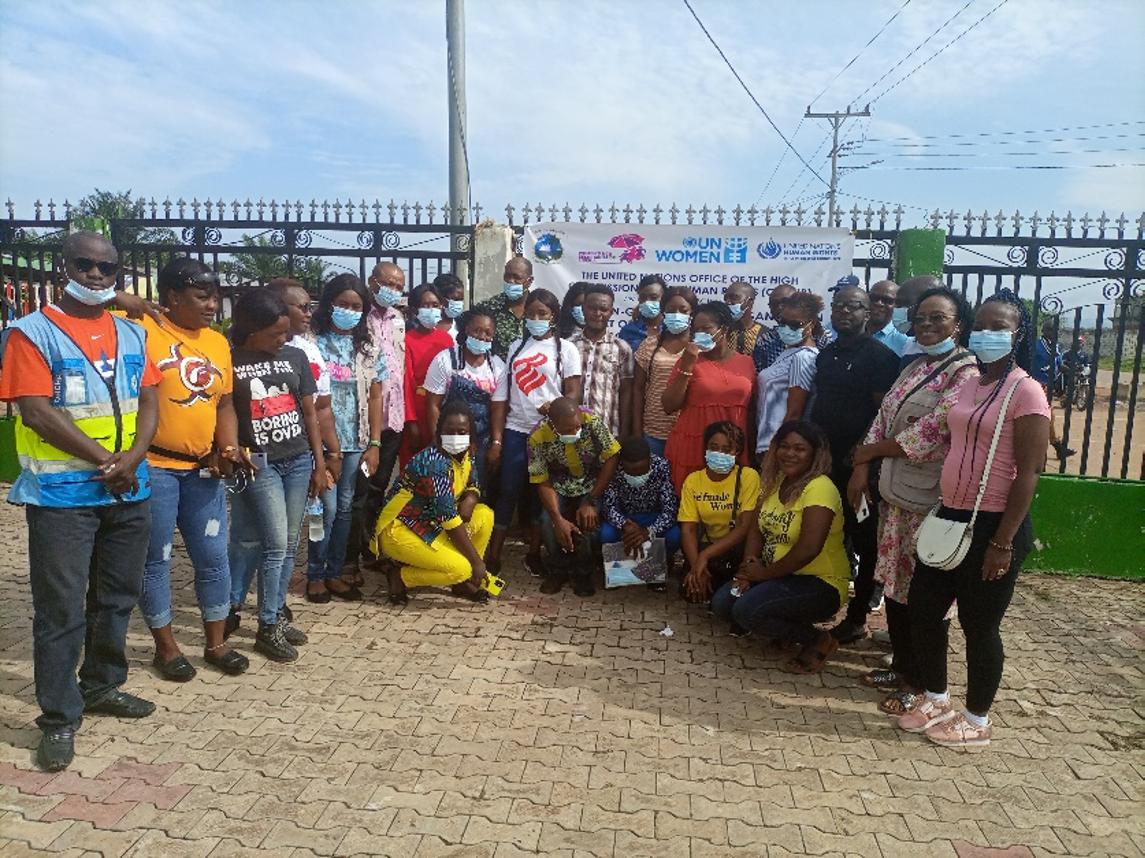
Africa-Press – Liberia. In the national budget, financial resources are not specifically focus on addressing critical issues affecting vulnerable segment of the country including women, children, disable persons, older persons.
In spite of United Nations resolutions such as United Nations Security Council Resolution (UNSCR) 1325 and massive advocacies by many institutions for equal opportunities for all vulnerable people are still not prioritized when it comes to making decisions on national issues such as the national budget.
Against this backdrop, the Office of the High Commissioner for Human Rights (OHCRH) Liberia in conjunction with the Women non-governmental organization Secretariat of Liberia (WONGOSOL) and the Government of Liberia from November 5 to 6 organized and facilitated a two- day capacity building program on promoting Gender based budgeting at National and local levels to achieve the Liberia National Action Plan on Women Peace and Security which was held in Ganta City, Nimba County.
The two-day capacity building program for Women human rights civil society organizations and members of the implementing and monitoring structure under the women peace and security Project funded by the Peace Building Fund brought to together heads of women led NGOs in Liberia, and representatives from the Ministries of Justice, State for Presidential Affairs, Gender and Children Protection, amongst others.
Lead Facilitator at the event, Wilfred Gray Johnson of the Sustainable Development Institute said the essence of the workshop was to focus on Gender Based Budgeting or Gender Responsive Budgeting with a Human Rights approach to the national Budget.
He said the phrase Gender Responsive budgeting it does not mean a separate budget for women but rather for the budget Gender responsive in terms of allocations targeted at addressing women issues affecting the same way as men.
Disaggregation of impact on issues affecting women
“When say gender responsive budget it does not mean the budget should only consider women issues, it considers men and women. The disaggregation in terms of the impact that budget will have on men as well as on women is what we are referring to as gender responsive budgeting”, Mr. Gray Johnson said.
He added “We need to look at where the most needs are-if we talk about funding for education, healthcare, we need to look at women in the area of health with issues such as infant mortality for child bearing mothers, how does the budget address these issues confronting women”.
According to him there are critical issues confronting women in Liberia that are not addressed in the national budget in terms of allocation and Civil Society organization need to raise these issues that are not making the budget Gender responsive.
Mr. Gray Johnson said in rural areas women lack access to proper health care such as facilities for safe delivery, lack of proper medication for pregnant women and as such women in the Civil Society should scrutinize the budget and ask hard questions as to why there are not adequate resource allocation to address these issues affecting women.
“In most rural parts of Liberia it is a reality that pregnant women have to be transported on motorbikes or carried by foot to give birth and this has been happening for many years. This is not Gender responsive for National Government to not allocate more resources to addressing these kinds of issues affecting only women continuously”, he indicated.
He challenged participants at the event to begin the process of scrutinizing the national budget to see whether these critical issues affecting women have been allotted financial resources to address.
During the group presentation session, the participants analyzed the budget of the National Legislature, Judiciary and Executive taking into account budgetary allocations to human rights.
The various groupings concluded in their separate presentation that the Government make less allocation to the Judiciary which has oversight over the rule of law aspect of the country and as such the issue of Human rights is not prioritized in the National Budget.
Mr. Gray Johnson challenged the women Civil Society leaders to begin the process of looking at the budget every year and fledging out areas that does not address gender and human rights issues.
He told the women Civil Society leaders that one problem is that the national budget centers too much around the presidency “The entire budget of our country centers around the president, so you do not know how Gender responsive is the budget” he observed.
“Many of you might know how much in terms of salary the president makes, but the president does not use any of that salary for electricity, water, health, regular medical checkups, food and others. Almost everything is free for the president paid for by the country but ordinary people who make less use their salaries to pay for everything while the person who makes more does not pay anything from their salaries”, he indicated.
Mr. Gray Johnson noted that the issue of imperial presidency is aged old and it is affecting the national budget from being gender responsive and making allocations to address critical areas affecting overall human rights.
‘Put People First in distributing resources’
Making a presentation on Human Rights based approach to budgeting, Igiriogu Francis Esq. Human Rights Officer –OHCHR said a human right based budget should emphasizes the importance of integrating human rights principles and standards in each and every part of a development process on the basis that the human rights normative framework helps to ensure more sustainable and equitable development outcomes.
The OHCHR Human Rights Officer said taking a human rights based approach to budgeting means distributing resources in a way that puts people first. He noted that it involves thinking through how people’s rights are impacted by the way that money is raised, allocated, and spent.
Said Mr. Francis “all governments must respect, protect and fulfil human rights. The way they generate, allocate and spend money play a key role in this. You can’t guarantee the right to vote if you don’t have an effective electoral system and you can’t guarantee the right to habitable, accessible, affordable and secure housing without well-regulated public and private housing sectors.
Mr. Francis also said a rights-based approach to the budget demands that policy choices be made on the basis of transparency, accountability, non-discrimination and participation.
He added “These principles should be applied at all levels of the budgetary process, from the drafting stage, which should be linked to the national development plans made through broad consultation, through approval by parliament, which in turn must have proper amendment powers and time for a thorough evaluation of proposals, implementation and monitoring”.
Amongst the groups that should be impacted by national budget that is Gender sensitive, Francis indicated that Human rights budgeting recognises that budgetary decisions can have materially different outcomes for different groups including women, children, disable persons, older persons and observed that Government budgets are not always sensitive to this.
He cautioned the women Civil Society leaders attending the two-day event that human rights budget scrutiny or analysis involves examining the public budget to assess a government’s compliance with its human rights obligations.
“This is done with the central goal of making public budgets more effective in helping to realise human rights, to ensure that everyone can live a life of human dignity” he told the participants.
He continued “This involves exploring both the budget process: to ensure that it is participative, transparent and accountable; as well as examining a government’s resource generation, allocation and spending with reference to the agreed human rights standards, as noted above”
Ernestine Ebai of
OHCHR said OHCHR and partner hope that the knowledge gained from the two days training will go a long way for advocacy in Gender Based budgeting in advancing the Liberia National Action Plan.
She said the training will be rolled out in other counties for more women civil society actors to provide them the tool to continuously analyze the national budget by advocating for more allocation to issues of human rights and holding national government to ensure that the National Budget is gender sensitive.
For More News And Analysis About Liberia Follow Africa-Press





